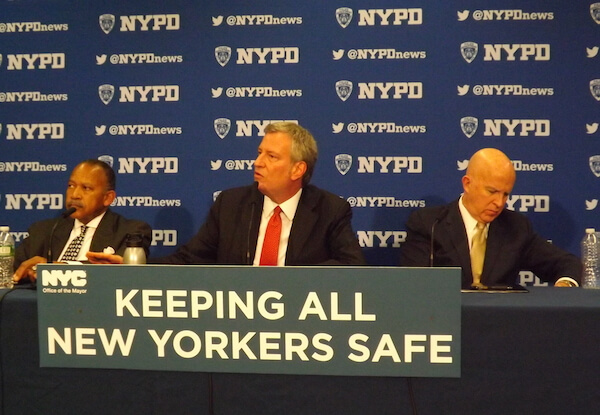Tom Hanks as Mike McAlary in Nora Ephron’s “Lucky Guy.” | JOAN MARCUS
Even if you care about the minutiae of the tabloid newspaper business in New York a quarter of a century ago, it will probably still be difficult to rouse any excitement for Nora Ephron’s posthumously produced non-play at the Broadhurst. The reason to see it, as the audience clearly illustrated 10 minutes in when he makes his first appearance, is to see Tom Hanks on stage. Hanks actually takes a kind of semi-bow on his entrance, a move worthy of the kind of provincial theater Dickens so wonderfully satirizes.
Hanks plays Mike McAlary, the notorious paper-hopping reporter/ columnist — Newsday to the Daily News to the Post to the Daily News… one loses track as interest wanes, quite frankly — who won the Pulitzer for breaking the Abner Louima police sexual abuse case even as he was succumbing to cancer at the age of 42. It is to Hanks’ credit that he makes this vain, venal, egotistical, and abrasive character semi-cuddly.
Despite Tom Hanks, “Lucky Guy” never gets a grip; “Hands on a Hardbody” is simple and powerful
Hanks’ innate charm and detailed performance cover the multitude of playwriting sins Ephron committed in creating an unabashed mash note to the kind of journalism that existed only in her fantasy — or in films like “The Front Page.” Ephron conveniently downplays or overlooks the fact that what motivated these papers was revenue. She tries to make the play about the fabled history of gritty journalism and “telling a story” or “making a difference.” She pays the fable lip service, but what she shows us are expensive libel suits and McAlary chasing a paycheck and a signing bonus.
The play also suffers from a linear structure preoccupied with events at the expense of characters, particularly when the events conflict with her romantic vision. The characters, even McAlary, are never more than two-dimensional, and the expository writing designed to give us insight is clumsy —including obscure newspaper slang tossed off with no explanation. Ephron defaults to the amateurish device of having characters identify themselves and state their issues, rather than showing us and letting us in. This is the death knell for a play that aims for any measure of universality — and if ever a subject matter needed something more universal, this is it.
Director George C. Wolfe has done his best to paper over the flaws in the play by adding a Greek chorus of gruff and testosterone-driven men (and a couple of “tough broads”), but the inventiveness of the staging and vocal work can’t replace the missing human factor. The inevitable effect is to make everyone else in the cast besides Hanks largely irrelevant, with not much to do and even less to show for it.
At the performance I saw, I overheard a couple arguing at intermission about whether or not to leave. The parting shot the woman levied at her companion was, “I couldn’t care less about this. I was living in Cincinnati at the time.” That’s exactly my point. Ephron’s unfinished and undeveloped play gives us nothing to relate to and falls flat. Another good reason to take your bow at the beginning.
The cast of “Hands on a Hardbody.” | THE HARTMAN GROUP
I hadn’t seen the cult documentary that was the basis for the new musical “Hands on a Hardbody.” You don’t need to, either, to enjoy this simple, heartfelt, and affecting musical. Yes, it’s riddled with conventions and familiar character types, but if you’re a fan of musicals, you know that in the hands of talented people those can work really well. A show that will put you in mind of “Steel Pier” and “Working,” “Hands…” is well told with wonderful music and outstanding performances. Like many a musical before it, it is also awash in obvious sentiment that nonetheless plunges you into a welter of emotions.
The story involves a group of ten down-on-their-luck Texans competing to win a Nissan pickup truck. They each put their hands on the truck, and the last one to let go wins. Against the backdrop of a depressed economy, this story is played out concurrently with that of the hurting auto dealership hoping the attention the contest brings will help revitalize its flagging sales.
The smart book by Douglas Wright gives each of the stereotypical characters an interesting and often unexpected story. The interaction among them is revealing and touching, and even though we understand that all but one will drop off a la “The Hunger Games,” Wright digs into the longing and loss that motivate each of the characters to believe that winning a truck could be the answer.
The music by Trey Anastasio is Broadway by way of Nashville, but he wisely builds in rock and contemporary ballad influences to suit individual characters and engage the audience. Amanda Green’s lyrics are smart and incisive, their deceptive simplicity also well matched to each of the characters.
The cast is outstanding. Most notably, Hunter Foster as veteran contestant Benny Perkins delivers some of his best work in recent memory. Focused and strong, his voice is in top form and he makes the character complex. Keala Settle, as Norma Valverde, delivers a gospel-infused number that stopped the show at the performance I saw. Dale Soules shines as Janis Curtis, giving a fiery intensity to the raspy-voiced pragmatist. Keith Carradine is excellent as the low-key JD Drew, a man rendered irrelevant by age and the economy who is trying to get some of his own back.
Neil Pepe directs with precision and focus, and Sergio Trujillo does a surprising, delightful, and inventive job with choreography that has built-in limitations as a result of the show’s conceit. Christine Jones’ set design makes ingenious use of the truck, and the lighting and costumes by Kevin Adams and Susan Hilferty, respectively, are perfect.
While other musicals are erecting huge edifices that can be dazzling and cold, this one is built on one of the most durable structures we know, the human heart. At the end of the day, that’s almost always what works best.
LUCKY GUY | Broadhurst Theatre | 235 W. 44th St. | Through Jun. 16: Tue., Thu. at 7 p.m.; Wed., Fri., Sat. at 8 p.m.; Wed., Sat. at 2 p.m.; Sun. at 3 p.m. | $82-$142 at telecharge.com or 212-239-6200
HANDS ON A HARDBODY | Brooks Atkinson Theatre | 256 W. 47th St. | Mon.-Thu. at 7:30 p.m.; Fri.-Sat. at 8 p.m.; Wed., Sat. at 2 p.m. | $49-$142 at ticketmaster.com or 877-250-2929
Editor's note: The print edition of this review inadvertently identified the writer as David Kennerley. Christopher Byrne wrote this review.



































